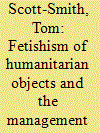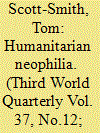|
|
|
Sort Order |
|
|
|
Items / Page
|
|
|
|
|
|
|
| Srl | Item |
| 1 |
ID:
123529


|
|
|
|
|
| Publication |
2013.
|
| Summary/Abstract |
This paper examines two common objects in humanitarian assistance: a therapeutic food called Plumpy'nut, and a tape for measuring malnutrition known as the muac band. It argues that humanitarian relief has become a standardised package reliant on such objects, which receive excessive commitment from aid workers and are ascribed with almost magical powers. Drawing on the Marxist notion of commodity fetishism, the paper proposes a three-part model for examining this phenomenon, in which humanitarian objects are bound up in processes of concealment, transformation and mystification. First, these objects are perceived as rootless, recent discoveries, allowing the complex history and ambivalent results of technology to be concealed. Second, they facilitate a single-minded attention to efficiency and aggregate survival, which transforms the way humanitarian action is understood. Third, these objects are imbued with a mystical and autonomous spirit, redefined as irreplaceable elements of aid. This 'fetishism of humanitarian objects', the paper concludes, prevents a more flexible and people-centred approach to relief.
|
|
|
|
|
|
|
|
|
|
|
|
|
|
|
|
| 2 |
ID:
149441


|
|
|
|
|
| Summary/Abstract |
This paper critically examines the ‘humanitarian innovation’ movement, arguing that it represents a departure from classical principles and the entry of a distinctive new ideology into the sector. Labelling this ‘humanitarian neophilia’, the paper argues that it has resonances of Barbrook and Cameron’s ‘Californian Ideology’, with its merging of New Left and New Right within the environs of Silicon Valley. Humanitarian neophilia, similarly, comes from a diverse ideological heritage, combining an optimistic faith in the possibilities of technology with a commitment to the power of markets. It both ‘understates the state’ and ‘overstates the object’, promoting a vision of self-reliant subjects rather than strong nation-states realising substantive socioeconomic rights.
|
|
|
|
|
|
|
|
|
|
|
|
|
|
|
|
|
|
|
|
|